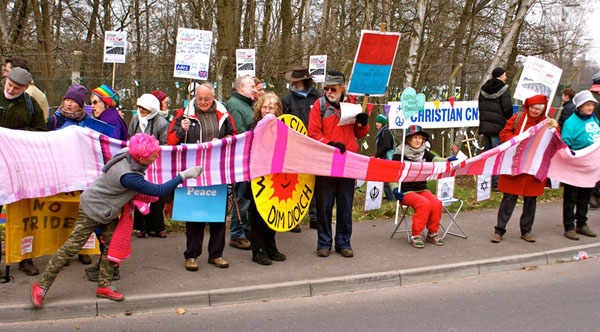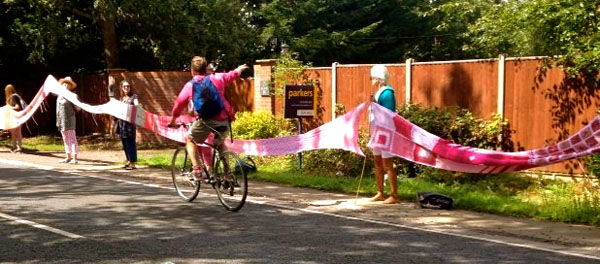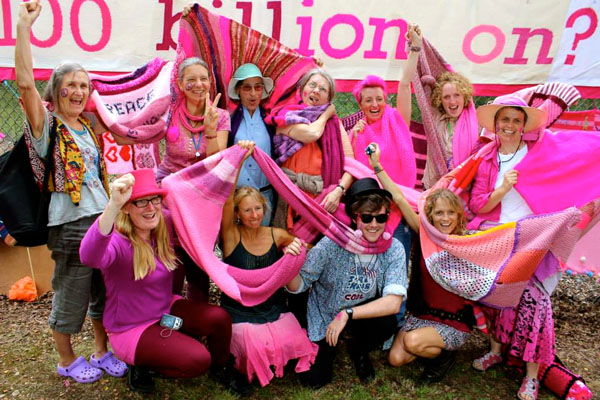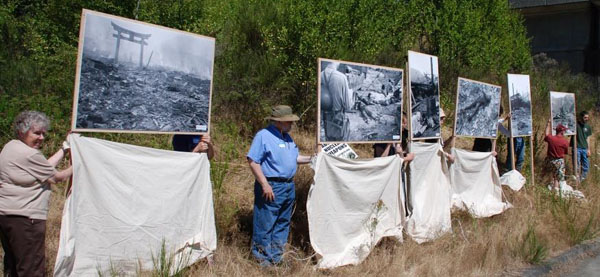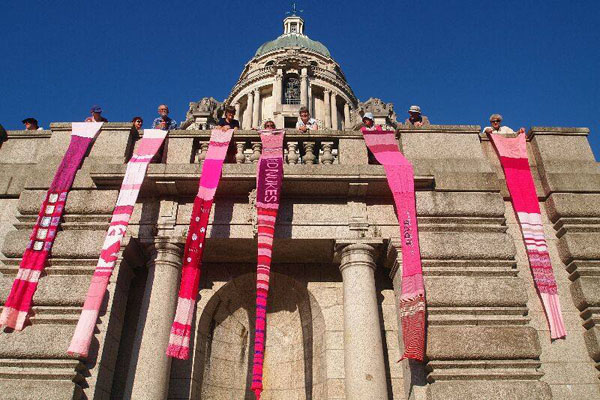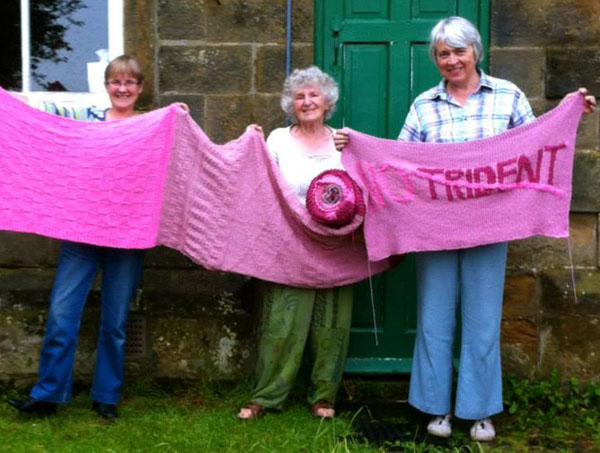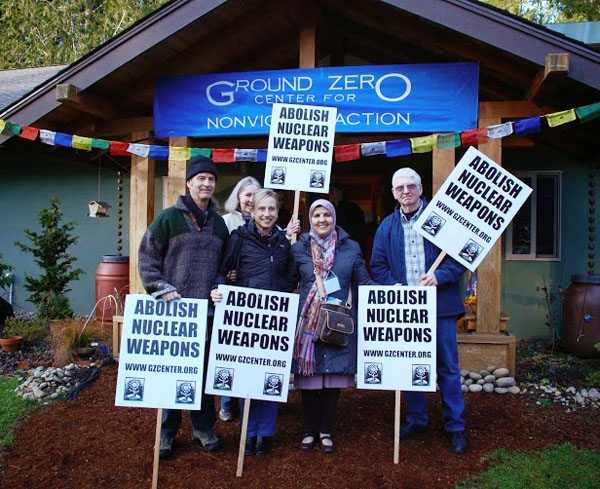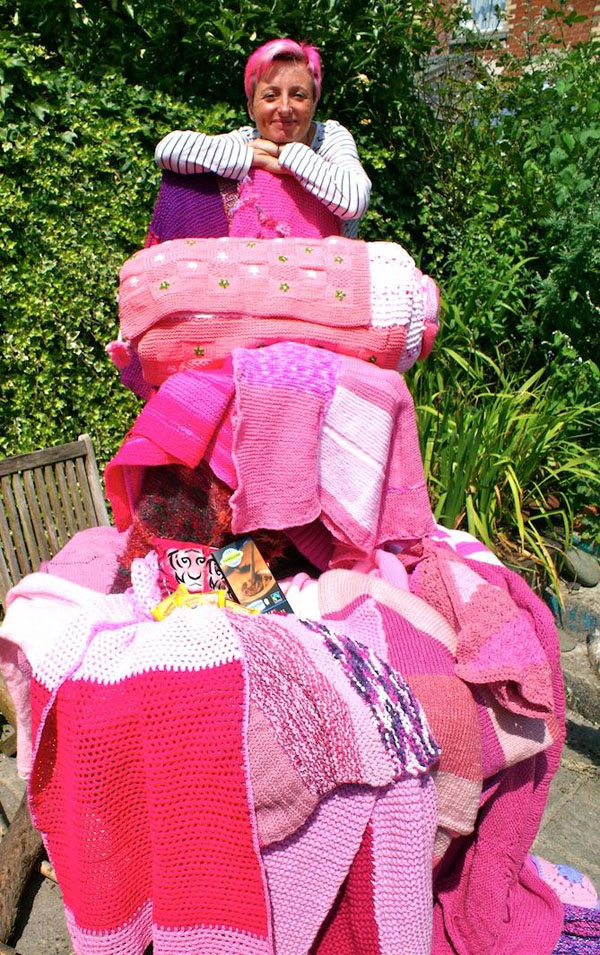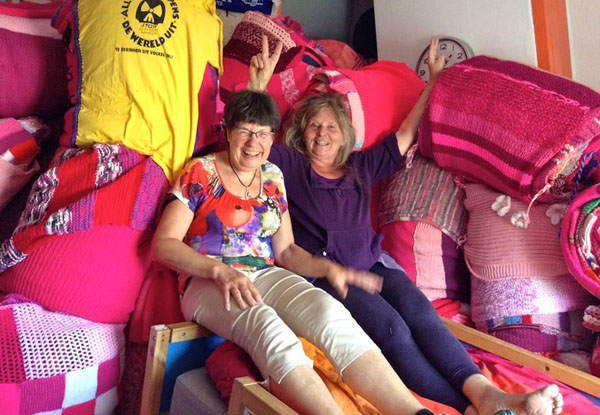This article is from our associated project, CreativeResistance.org
Seven-mile scarf unveiled at Berkshire Trident protest
Protesters (Wool Against Weapons, Action AWE) have unveiled a seven-mile “peace scarf” as part of a protest in Berkshire against replacing the UK’s Trident nuclear weapons system.
The scarf, which took thousands of hours to knit, was stretched from the Atomic Weapons Establishments in Aldermaston to Burghfield.
It was created from hundreds of pieces of knitting made across the world and took about five hours to assemble.
Campaigners have spent the past eight months making the scarf.
Police closed several roads for about five minutes at 13:00 BST, to enable all of the pieces of material to be connected for the whole seven-mile distance.
The sites in Aldermaston and Burghfield provide the warheads for the submarine-launched missile system.
Symon Hill, from Action AWE, said: “It’s a creative way of making a point that is shared by millions of people around the world, which is concern about the impact of nuclear weapons if they’re used.
“It costs £100bn to renew Trident at a time when we are experiencing cuts to public services and the welfare state that we need.”
The scarf was assembled by hundreds of people on the morning of the protest using ribbons and safety pins.
The demonstration was organised by Action Atomic Weapon Eradication (AWE) and the Campaign for Nuclear Disarmament (CND).
A final decision on whether to renew Trident, the UK’s nuclear deterrent, is due in 2016.
More photos on Wool Against Weapons’ Flickr and Facebook pages.
More video on Action AWE
Washington State Action by
Ground Zero Center for Nonviolent Action
Leonard Eiger, Ground Zero Center for Nonviolent Action
Silverdale, WA, August 9, 2014: Peace activists rolled out a 60-foot-long scarf at a West coast nuclear weapons base in a demonstration against the Trident nuclear weapons system on the anniversary of the atomic bombing of Nagasaki.
The Trident submarine base at Naval Base Kitsap-Bangor, just 20 miles from Seattle, Washington, represents the largest concentration of operational nuclear weapons in the U.S. Arsenal.
Each of the 8 OHIO class submarines at Bangor carry as many as 24 Trident II(D-5) missiles, each capable of carrying up to 8 independently targetable warheads. Each nuclear warhead has an explosive yield up to 32 times the yield of the bomb that destroyed Hiroshima.
At Saturday’s demonstration people lined the roadside at the Bangor Main Gate with signs and banners calling for the abolition of nuclear weapons. Participants also unveiled huge photos of the devastation caused by the Nagasaki bombing.
Local singer/songwriter Jim Page sang a number of anti-war songs, including one his best known songs, Hiroshima Nagasaki Russian Roulette.
When Page finished his concert, five participants walked on to the base entrance lanes of Highway 3/Luoto Road carrying the scarf. An additional participant, a Buddhist monk, entered the roadway drumming and chanting. Washington State Patrol troopers removed all six protestors and the scarf from the roadway.
They were cited on the scene for being on the roadway illegally, and were released. Those cited were David Brice, Port Orchard, WA; Mack Johnson, Silverdale, WA; Doug Milholland, Port Townsend, WA; Elizabeth Murray, Bellingham, Wa; Gilberto Perez, Bainbridge Island, WA; and Dylse (Rick) Turner, Seattle, WA.
The wool scarf was composed of pieces knitted by people from around the United States and assembled into a single scarf in an action known as Wool against Weapons.
Wool against Weapons began in the United Kingdom as a statement against the Trident nuclear weapons system deployed by the British government. Activists there held an action on August 9th stretching a seven mile-long scarf between their Atomic Weapons Establishments.
Following the return of the arrestees, the demonstrators were led in peace songs by folk singer John Palmes, who wrote The Atombomb Song. Palmes is from Juneau, Alaska.
Sunday’s vigil and nonviolent direct action were the culmination of a two-day event at Ground Zero Center for Nonviolent Action called MUSIC NOT M.A.D.NESS. It focused on the power of music to bring people together in common cause, and included a concert by Bainbridge Island group Chele’s Kitchen.
Ground Zero has been working to stop the Navy’s construction of a $715 million Second Explosives Handling Wharf at Bangor. The case is currently in the 9th Circuit Court of Appeals; the opening brief was filed on June 18th.
Ground Zero is also engaged in a campaign to defund the Navy’s next generation ballistic missile submarine. Known officially as the OHIO Class Replacement or SSBN(X), the project, in addition to the estimated $100 billion in construction, will cost taxpayers hundreds of millions over its lifecycle.
Ground Zero spokesperson Leonard Eiger said: “New Trident will only serve to increase global proliferation of nuclear weapons while increasing the risk of nuclear war. At a time of austerity, building a new generation of ballistic missile submarines is a flagrant waste of taxpayer dollars. It is also in clear violation of international humanitarian law as well as article VI of the Treaty on the Non-Proliferation of Nuclear Weapons (NPT). New Trident has been essentially rubber stamped with no discussion regarding the rationale for its continued existence in a post-Cold War world.”
Ground Zero will be working to build awareness among legislators in Washington, D.C. regarding the reasons for defunding New Trident in coming months.
For thirty-seven years Ground Zero has engaged in education, training in nonviolence, community building, resistance against Trident, and action toward a world without nuclear weapons.

